Those Green Hills
First, the site. A Corridor between hills, a shallow trench rather than a valley.
The trench lies on the axis south west to north east, with high hills along the northern and western sides whose names form a litany; Black, Divis, Squires, Cave, Carnmoney.
To the south and east of the Lagan there is another steady roll of lower hills.
Belfast is one of the few cities that can be taken in at a single view. David Brett (p. 19)
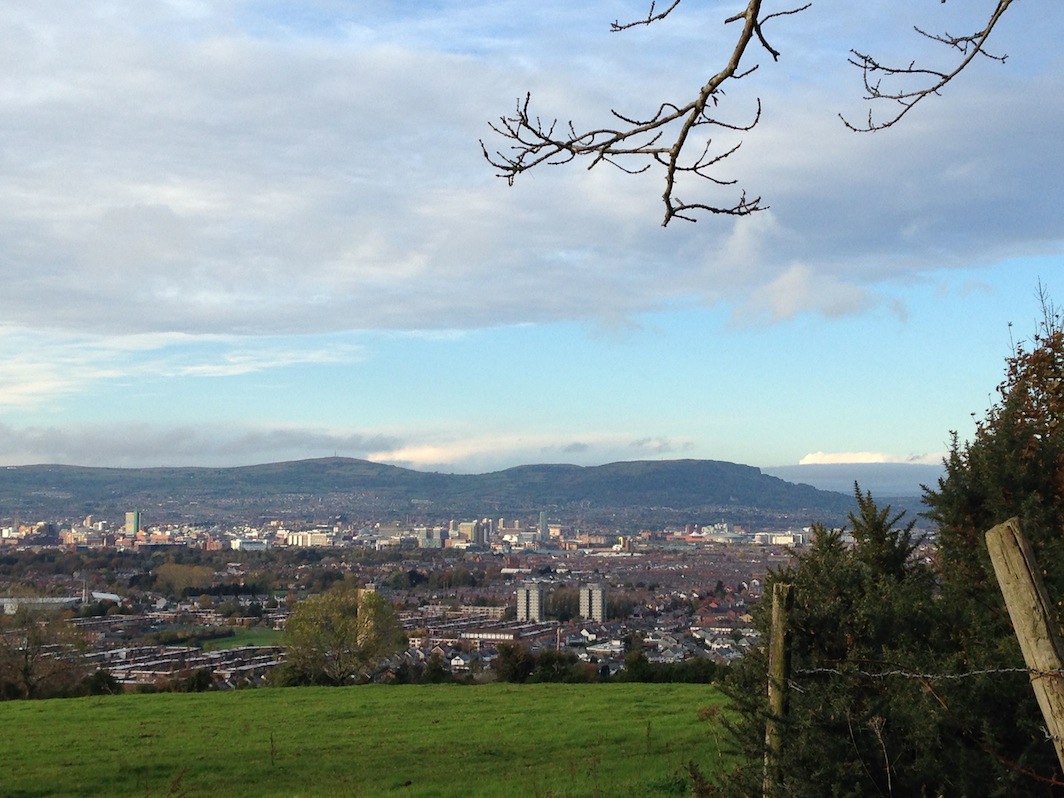
I think I was 18. No, that can’t be, it doesn’t add up… I was at least 20.
My hot rod was a blue SH scooter. I went everywhere with it, it took me kilometres and kilometres away from Talenti, a suburban area of Rome. This is how I got to know Rome: the centre, the suburbs, at night, at dawn, in the heat, in the rain. That endless Via Nomentana to return home – I never ever managed to hit that famous streak of green lights.
A return home always framed by a tree-lined boulevard that takes my breath away even today.
That boulevard has always had the air of a Japanese print. Those trees, with their perpetually fresh foliage, create a green trellis that has always, in my imagination, referred back to the blooming apple trees of Proustian catharsis in The Heart’s Intermissions. The only thing I’ve ever wanted to reproduce visually. In fact, I created an exhibition, or rather: I asked a few artists to illustrate that catharsis for me, yet none of them dared to represent those apple trees in bloom.
Anyway, where was I… Yes, my blue SH that was so “in” during the second half of the nineties and that, let’s be honest, was a bit pariolino, snobby [disguised by me as “alternative”], it took me everywhere and often took us everywhere, me and a friend. My best friend at the time, who always sang his heart out with me on our rides, lived on the Serpentara. Incredible, even then I would always go to pick friends up and take them home. Deep down, I can say now it was a kind of syndrome of control – basically, I didn’t trust anyone.
Just before getting to his house, it was almost dawn of a nearly-spring night, revving the gas at a green light, in a moment of suspension of all sound, I hear a chirp. That typical chirping that signals the end of an evening out for all the night owls. It distresses some, and makes others happy.
I don’t know why, but that chirp spoke the language of separation and it told me that my first great love had gone. It had a revelatory ability that my conscious apparently didn’t want to recognize. Since then, inevitably, that sound has become tinged with nostalgia, of the tender and sweet kind. It neither distresses me nor makes me happy, it simply always takes me back to that exact moment: the green light, the gas, my great friend behind me, a few seconds of silence and then… that flash of sound.
As to place, let us say only that it seems to be somewhere in the northern hemisphere. As to time, this is even more difficult: not only because time itself is of its nature a fluid: nor merely because the City often seems to exist in an alternative stream of history: but mostly because, in the time-dimension, the City seems constantly to be slipping and sliding backwards, and never quite able to make up what it has somehow lost. Albert Rechts (p. 9)
So shall we talk about that? About birds I mean?
There are amongst the animals that have most frequently tried to tell me things and now I swear by them.
There, by the overflowing litterbin, a mature turdus merula with a Twix wrapper clamped tightly in its beacon-bright orange beak; the gold and red of the wrapper, together with the colour of the bird’s beak, suit each other well. I wonder if the bird has actually eaten the Twix, or just likes the look of the wrapper. I’d like to see the nest that that wrapper becomes woven into: shiny. Maria Fusco (p. 45)
We went inside. It was one of the first vacations. The house in the mountains.
It only happened that one time but, like all the house floods that characterized our relationship in 9 years, I can say that we understood immediately that this was not a good sign at all. But we never said it clearly, only thought it.
All the windows of the house had the signs of a great struggle between life and death. A few birds, having entered from the fireplace (or fallen from the nest of a careless mama bird?) had tried in every way to escape through the windows of a closed-up house, uninhabited for months. I don’t know why we always left the shutters halfway closed. Taken by the light they smashed, smashed, smashed… but the closed-up house had become their cage, and then their grave.
I don’t remember how many there were. I left him to deal with them, like in every situation of death. I said I couldn’t do it. Who could imagine that after that, one day, all I would have to do is take death, that bastard, in my hands, give it a nice bang on the head. But, I did it. Sure, a bit bruised, but for the moment I had escaped.
When the bird eventually manages to stand up, it looks very confused and just stands there stock-still, blinking for some minutes. Can it remember how it got from the tree’s branches to the ground? Was it pushed, or did it forget how to fly? M. F. (p. 46)
How nice it is when animals play dead to protect themselves from an enemy.
Now I remember that as a one of my favourite games was to play with our household cat, Virgola, who became anxious, paced around me, not knowing what to do, sniffing me. She nearly had panic attacks. Of course, what kind of game…
Once a swallow got my window mixed up with the sky and slammed into it. Obviously, one of my cats ran to get it, but I managed to pull it out of its mouth before it could break its neck. But the swallow played dead, enclosed in my hands. When I opened them, it defecated in fear and flew away. A huge relief, because I had never before been able to save any animal, once caught by my cat.
Recently, a bird confused the sky with my window again; this is why I always lower the shades; which is difficult to explain to a virtual stranger who doesn’t accept others’ habits. A loud sound, a thud, while I was making the morning’s coffee, left a stain on the glass, the stain of a warm body on a cold and hard surface; just like in the mountains, so many years before. No, not a good sign. I didn’t find the bird but I followed its advice straightaway. Why wait? Times flies when the first life is gone.
Counting its suburbs, its outliers, and its dormitories, the City has a population of around half a million humans; about the same numbers of rats; a rather smaller number of cats, dogs, parrots and budgies; a much larger number of bed-bugs, fleas, bluebottles and cockroaches. A. R. (p. 11)
Oh God… what a shudder I get from cockroaches. And the stag beetle? I get that it’s rare to see it and beautiful but I’ve seen it one too many times.
That morning that I squashed a cockroach with my foot.
The satisfaction of being able to get crickets and huge spiders out of the house, alone, with your eyes closed. The price of having plants.
Even Arturo, my black and white cat, was afraid of a mantis “daughter” on the terrace. Well… who can blame him. Animal instinct. That one made her own self extinct from my terrace; she ate not only her partner during intercourse but I think even her offspring, or so Wikipedia informed me.
The City is bounded to the north by a mountain range of high fantastic pinnacles of hard black basalt. (…) The tumbled plateau beyond the mountains affords a measure of shelter from the icy winds which, in winter, rush down from the polar north.
However, in exchange, it attracts a shroud of murky cloud which too often strays southward and clings clammily to the northern quarters of the City.
To the east, the sea: grumbling, ebbing, flowing, sometimes overflowing, in the narrow channel of its fjord. A. R. (p. 11)
At one point I saw a lot of foxes. One even during the day, who stopped and watched us for a long, long time and yawned. It had its portrait taken and it left.
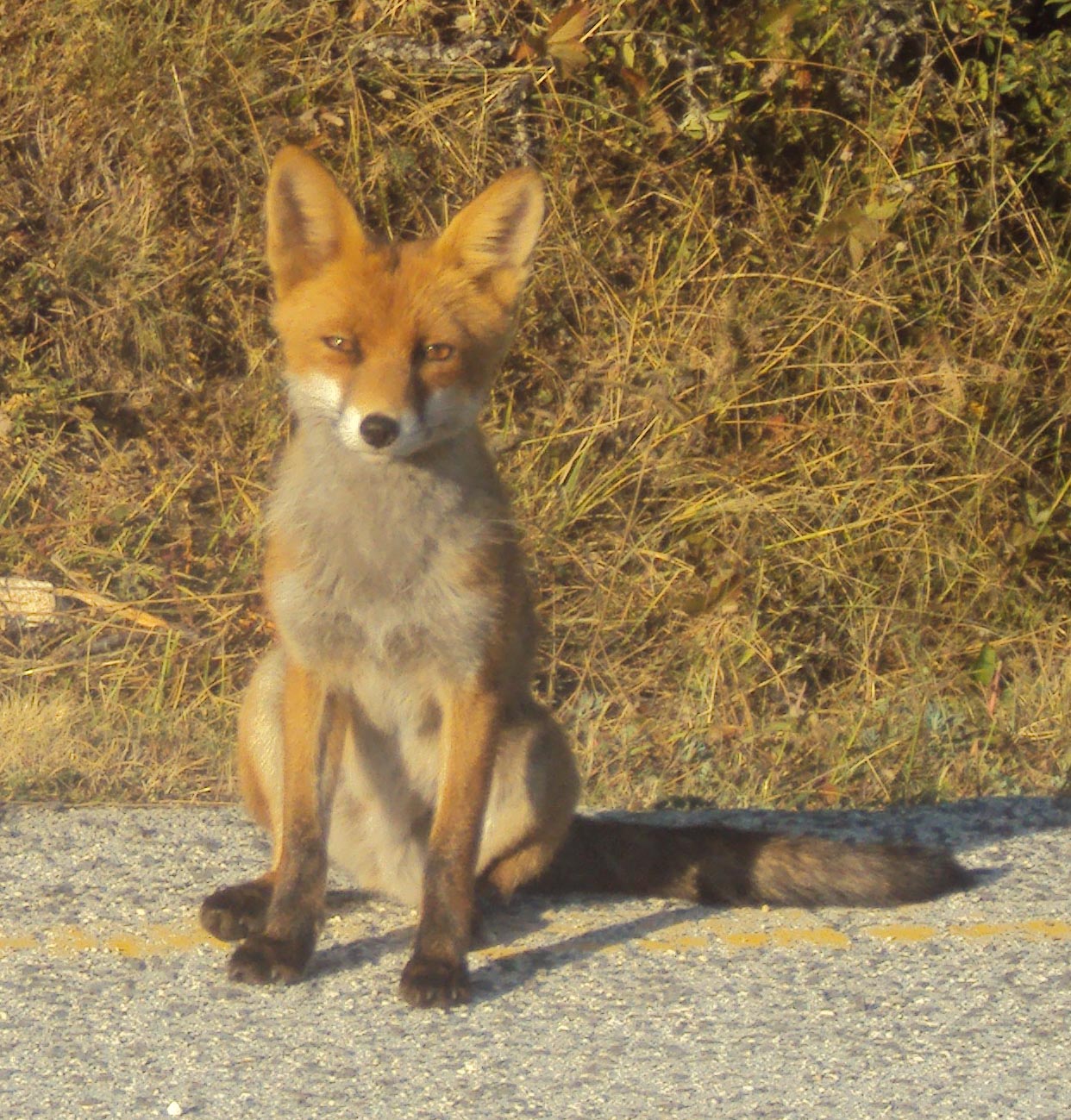
To the south, rolling hills and downland, punctuated by the strong farms of stout loyal yeomen; then broad inland lakes; then a sky-high range of rounded granite mountains whose peaks are usually hidden from the City by cloud. Beyond those mountains, another country: to some of the people of the City, a Promised Land; to others, a foreign and menacing Unfriendly Power. To the westward, the valley floor with its winding river leading to the mysterious and sinister interior.
The arena, tier upon tier, contour upon contour, looking down upon the open stage which is the heart and the centre of the City. A. R. (p. 12)
It wasn’t a dream; I swear, two times, with two different people, that at the cathartic shriek of a nighthawk from the top of the mountain, clouds and bad weather arrived.
A familiar feeling. Not entirely unpleasant.
Belfast has this way of raining that’s peculiarly Northern Irish. I’ve never been soaked anywhere else the way I’ve been soaked here. It’s subtle. It’s persistent. It’s drenching. M. F. (p. 53)
Frightened, the first time we ran away and saw a surge of lightning.
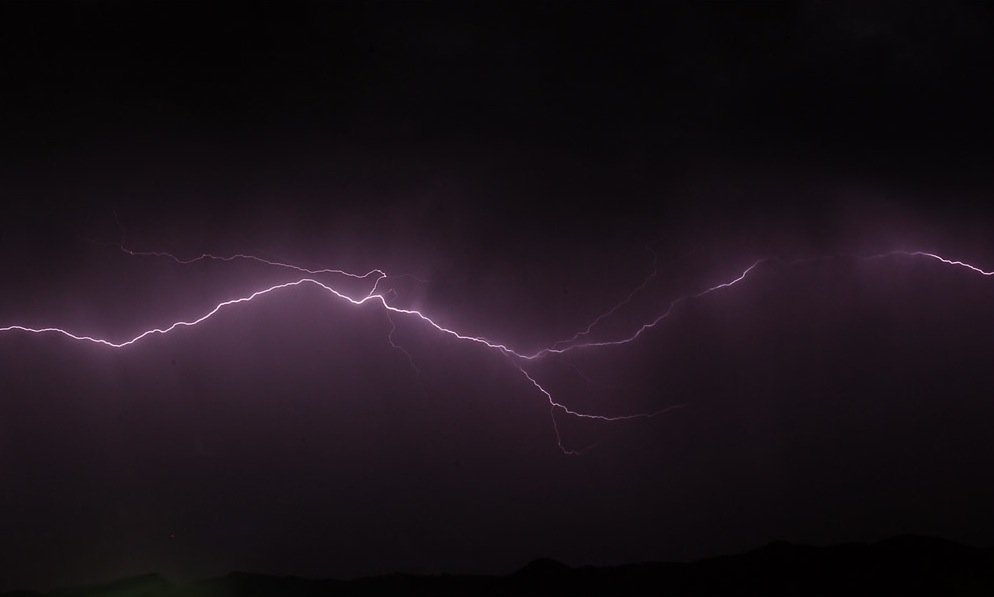
People and cars have learnt to deal with this relentless patter. They have short lives. They decay rapidly. They expire before their time. Both, however, have developed long memories to compensate, tracking their way back and forth across a saturated city that’s really too small to be a city at all. M. F. (p. 53)
The second time, instead, a white wolf came close, David Lynch-style.
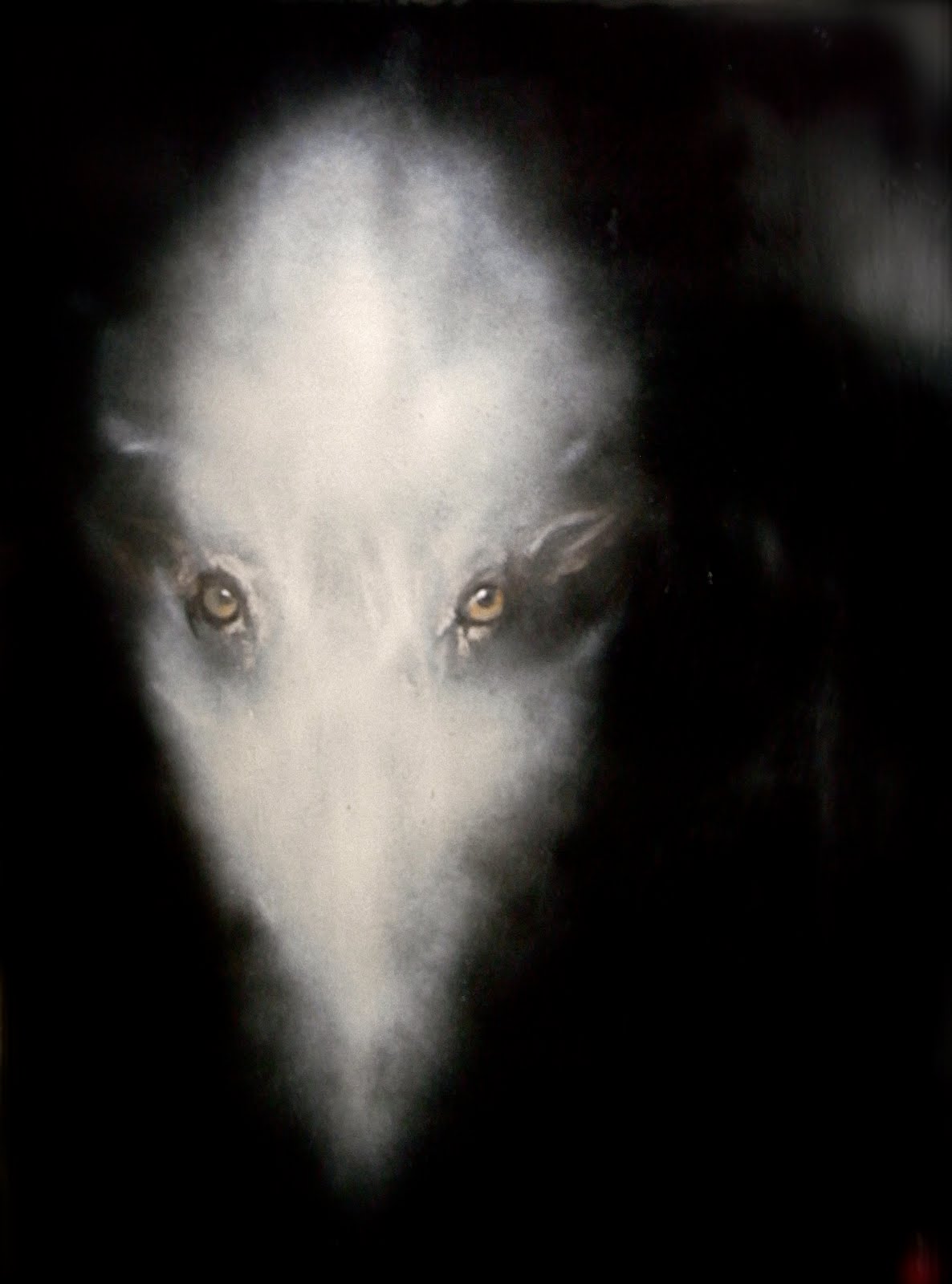
Emiliano Maggi, Jack London, 2011, oil on paper, 100×70 cm.
Third: there is also a Belfast weather and a Belfast light. Unpredictable in the extreme, shifting three seasons in the course of a day.
The light, in consequence, changes by the hour and either blinds us or obscures, and obscures by its brightness. D. B. (p. 19)

Look how many birds are on those roofs. Like the Roman starlings… but we’re not in Rome, no, we’re in Milan. But they’re big, are they pigeons? I don’t know.
My mother, as usual, sees beauty in their taking shelter from the rain right on our window, but doesn’t fully understand what kind of calm we need.
Finally the relatives leave us alone. I have yet to understand why they’re all convinced that their presence does us good. They make me nervous.
The noises of their little feet on the window in the end comfort me/us and I dream that the girl and I go away, we take the liberty of going out, with those absurd nightshirts that they forced us to wear, even if we have to wait hours, and we walk hand in hand.
It was a really nice dream, that one. I believe that you, that girl whose name I didn’t even want to know, have had the same dream. I’m sure of it. An intimacy that will link us together forever, for this reason we didn’t want to exchange contact details.
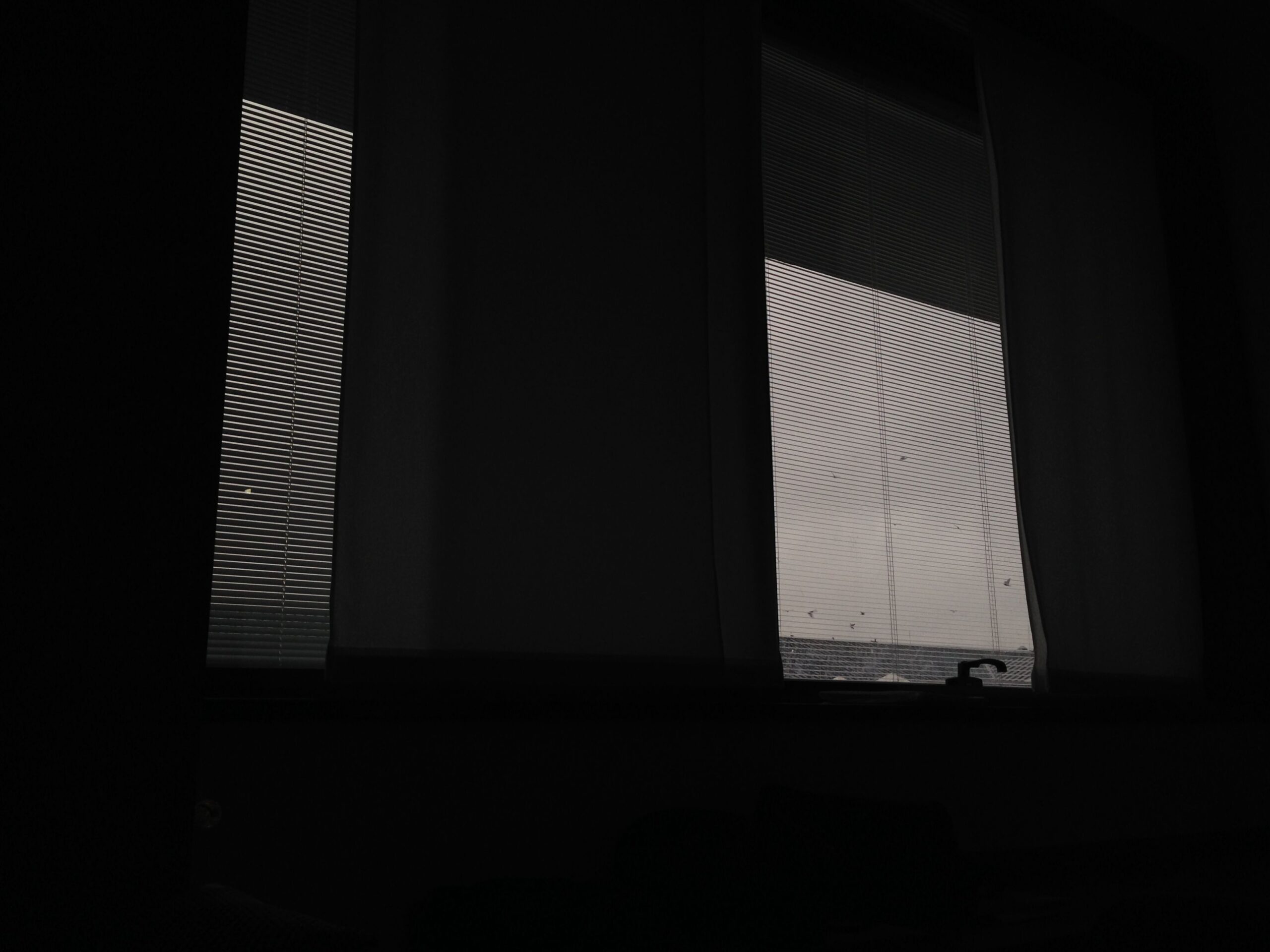
The City, physically if not spiritually, enjoys a temperature climate.
The amphitheatre of the City is roofed and ceilinged by an ever-changing kaleidoscopic canvas of over-sailing clouds against a farthest blue.
The people of the City are well acclimatised to rain.
Its absence for a longer-than-usual dry spell sets their nerves on edge, and gives rise to almost sexual tensions.
Within historic memory, no tidal waves, earthquakes or tsunamis; nor is there any active volcano near the City; which, in truth, has no need of one. A. R. (pp. 21-22)
An April morning. My sister is driving. I open the window. On the Lungotevere. There’s traffic. I feel her pain, her incredible never-managed anxiety. I’m sorry. I am the cause of everything and I’m the one that, deep down, is suffering the least. I open the window, a lovely breeze comes in, I lean my face into it and the wind attempts to tussle my short fringe. I don’t hear the noise of the traffic any more, I don’t feel the anxiety of my sister.
I only feel that wind in my hair, and I feel a profound sense of peace.
I think of the bird’s chirp of that dawn and I feel the same sweet nostalgia. Nostalgia of life, but sweet, beautiful. I savour the end but then I think: “What if I never saw a bird fly again?” I sink back into reality and I tell myself that deep down, I still want to be here.
There is a propaganda drive to make Belfast appear normal, and this is lead by retail interests and their architecture: well and good! But at the same time the population has become even more divided into sectarian segments, or increasingly separated by gates. Architecture and planning are absolutely powerless to prevent this because the problem is political, and beyond that, constitutional, and beyond that, ultimately, a question of legitimacy. Belfast is not and can never be a normal city until all its citizens can walk all its streets. D. B. (p. 26)
Here’s why. Because I fell in love with this absurd city [Belfast] and because over the years this emotional correspondence between her and me has resonated ever more.
Those that have taken that bastard [death] in their hands many times, and many times they have given it a good bang in the head.
Those green hills in the distance make her so beautiful, special, dreamy, with their rainbows, that light… Those open wounds at every step. A city that, if you go around with your chin held high, lets you see the blue and green, but if you insist on walking with your head down it will tear you apart at every turn. Unfortunately, like many Romans, I’ve taken to walking with my head down, to avoid potholes and, especially, the countless droppings from dogs belonging to owners more doglike than they are. Could it be for this reason that I don’t love dogs? They remind me of their owners?
